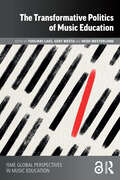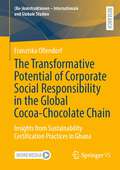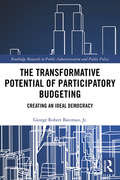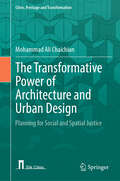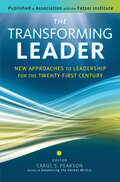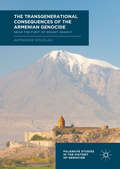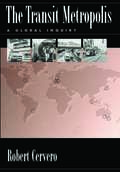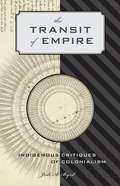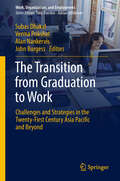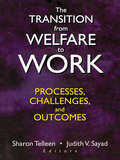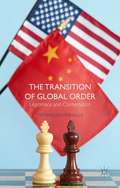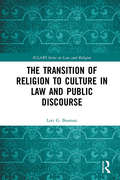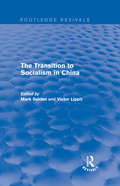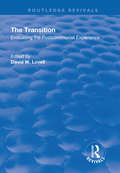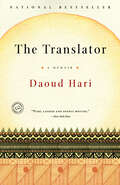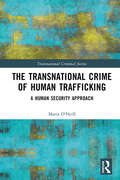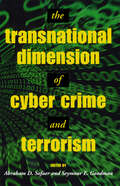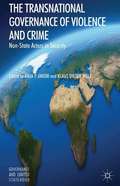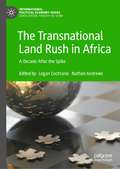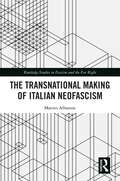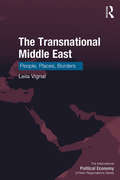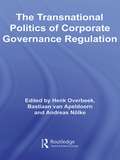- Table View
- List View
The Transformation of the Workers' Party in Brazil, 1989-2009
by Wendy HunterDrawing on historical institutionalism and strategic frameworks, this book analyzes the evolution of the Workers' Party between 1989, the year of Lula's first presidential bid, and 2009, when his second presidential term entered its final stretch. The book's primary purpose is to understand why and how the once-radical Partido dos Trabalhadores (PT) moderated the programmatic positions it endorsed and adopted other aspects of a more catch-all electoral strategy, thereby increasing its electoral appeal. At the same time, the book seeks to shed light on why some of the PT's distinctive normative commitments and organizational practices have endured in the face of adaptations aimed at expanding the party's vote share. The conclusion asks whether, in the face of these changes and continuities, the PT can still be considered a mass organized party of the left.
The Transformative Politics of Music Education (ISME Series in Music Education)
by Gert Biesta Heidi Westerlund Tuulikki LaesThis book introduces a unique approach to the interconnections between music education and politics. By taking a broader, more diverse, and explicitly ethico-political philosophical and theoretical stance, the book challenges institutional and structural conditions that may be resistant to change and expands the understanding of the professional responsibility of music educators in the 21st century to meet a variety of societal and ecological challenges.Emerging from a collaboration between international music education scholars and prominent contemporary educational theorist Gert Biesta, this book connects contemporary educational theories with music education to unlock its transformational capacity. In eight chapters, the contributors show how music education can move towards ways of being and doing that are attuned to social justice and to the broader social and ecological responsibility of music professionals. Strengthening the interdisciplinary connections between music education and education, philosophy, sociology, policy, systems thinking, and more, the volume offers a renewed vision of the scope and boundaries of both music teacher education and professional work in music more widely.Connecting the decades-long work of internationally established music educator scholars and ideas from large-scale research projects with a shared interest in transformative theorisation, this book fills a knowledge gap and reframes the philosophy of music education as a vibrantly multidisciplinary, theory-generating field. Relevant to researchers and students across music teacher education and performance studies, this book speaks to both conservatoires and university contexts across Europe and North America, helping us unlock the transformative capacity of music education.
The Transformative Potential of Corporate Social Responsibility in the Global Cocoa-Chocolate Chain: Insights from Sustainability Certification Practices in Ghana ((Re-)konstruktionen - Internationale und Globale Studien)
by Franziska OllendorfThis book engages with the implications of an expanding Corporate Social Responsibility (CSR) of Transnational Corporations in their supply chains. Taking the case of a cocoa sustainability certification project in Ghana, the study examines the implementation process of such a transnational CSR intervention and its outcomes regarding the local governance and institutional environment of the cocoa sector in Ghana. The study deploys a theoretical framework based on Global Value Chain Analysis and a neo-Gramscian approach to Global Governance to assess transnational CSR as a concept and strategy that reflect power struggles in global production fields.
The Transformative Potential of Participatory Budgeting: Creating an Ideal Democracy (Routledge Research in Public Administration and Public Policy)
by George Robert Bateman, Jr.In this book, George Robert Bateman, Jr. presents a philosophical examination of the potential benefits of participatory budgeting (PB), with recommendations of how they might be realized. The work of social philosophers like Thomas Jefferson, John Dewey, Robert Putnam are studied to better understand the potential benefits and their effect on individuals and communities. Using social provisioning and John Fagg Foster’s theories of instrumental value and institutional adjustment, Bateman demonstrates how participatory budgeting in New York City (PBNYC) can realize its full potential and transform individual participants into their better selves and also transform their communities. This transformation can occur when participants are able to make decisions about things that matter in their lives. As more of us become empowered and actively engaged in deliberations concerning local economic/political issues the more we will experience public happiness, greater understanding of others, greater development of our morality, and an increased sense of belonging. The Transformative Potential of Participatory Budgeting will be of great interest to scholars in the fields of normative political theory, political philosophy, local politics, heterodox economics, institutional economics, political sociology, urban sociology, and community sociology.
The Transformative Power of Architecture and Urban Design: Planning for Social and Spatial Justice (Cities, Heritage and Transformation)
by Mohammad Ali ChaichianInformed by urban political economy and critical social analysis, this book provides a critical comparative analysis of macro- and micro-level spatial design processes in architecture and urban planning. It interrogates the extent to which past and existing approaches to design have catered to social justice issues. With a special focus on the Right to the City approach and recent efforts to democratize urban spaces in the post-COVID 19 pandemic era, the book draws on examples of spatial design from the USA, Northern European countries and elsewhere to shed light on the presence (or lack) of social justice concerns in liberal capitalist and social democratic societies. This book is an important academic addition and resource for undergraduate and graduate curricula in architecture and urban planning/design programs, as well as a complementary resource for practitioners and policy planners who engage in urban development and transformation.
The Transforming Leader: New Approaches to Leadership for the Twenty-First Century
by Carol S. PearsonNo organizational leaders can succeed in today’s fast evolving and highly connected world on their own. To succeed, today’s leaders must not only optimize all their own faculties—mental sharpness, emotional depth, imagination, and creativity—but also utilize the full capacities of those around them in a collaborative and creative manner. The prestigious contributors to this volume draw on psychology, sociology, neuroscience, social networking theory, organizational change theory, myths and traditions, and actual experiences to discover how leaders today achieve transformational results. The Transforming Leader offers an overview of what transformational leadership is, how it works, and how it is evolving. In doing so it reframes the challenge of leading in today’s interdependent, unpredictable world.
The Transgenerational Consequences of the Armenian Genocide: Near The Foot Of Mount Ararat (Palgrave Studies in the History of Genocide)
by Anthonie HolslagThis book brings together the Armenian Genocide process and its transgenerational outcome, which are often juxtaposed in existing scholarship, to ask how the Armenian Genocide is conceptualized and placed within diasporic communities. Taking a dual approach to answer this question, Anthonie Holslag studies the cultural expression of violence during the genocidal process itself, and in the aftermath for the victims. By using this approach, this book allows us to see comparatively how genocide in diasporic communities in the Netherlands, London and the US is encapsulated in an historic narrative. It paints a picture of the complexity of genocidal violence itself, but also in its transgenerational and non-spatial consequences, raising new questions of how violence can be perpetuated or interlocked with the discourse and narratives of the victims, and how the violence can be relived.
The Transit Metropolis: A Global Inquiry
by Robert CerveroAround the world, mass transit is struggling to compete with the private automobile, and in many places, its market share is rapidly eroding. Yet a number of metropolitan areas have in recent decades managed to mount cost-effective and resource-conserving transit services that provide respectable alternatives to car travel. What sets these places apart? In this book, noted transportation expert Robert Cervero provides an on-the-ground look at more than a dozen mass transit success stories, introducing the concept of the "transit metropolis"--a region where a workable fit exists between transit services and urban form. Cervero has studied cities around the world, and he makes a compelling case that metropolitan areas of any size and with any growth pattern can develop successful mass transit systems. Following an introduction that frames his argument and outlines the main issues, Cervero examines five different types of transit metropolises, with in-depth case studies of cities that represent each type. He considers the lessons of the case studies and debunks widely held myths about transit and the city. In addition, he reviews transit program efforts underway in five North American cities and discusses the factors working for and against their success. Cities profiled include Stockholm; Singapore; Tokyo; Ottawa; Zurich; Melbourne; Mexico City; Curitiba, Brazil; Portland, Oregon; and Vancouver, British Columbia. The Transit Metropolis provides practical lessons on how North American cities can manage sprawl and haphazard highway development by creating successful mass transit systems. While many books discuss the need for a sustainable transportation system, few offer examples of successful systems and provide the methods and tools needed to create such a system. This book is an invaluable resource for transportation planners and professionals, urban planners and designers, policymakers, and students of urban design and planning.
The Transit of Empire
by Jodi A. ByrdIn 1761 and again in 1768, European scientists raced around the world to observe the transit of Venus, a rare astronomical event in which the planet Venus passes in front of the sun. In The Transit of Empire, Jodi A. Byrd explores how indigeneity functions as transit, a trajectory of movement that serves as precedent within U. S. imperial history. Byrd argues that contemporary U. S. empire expands itself through a transferable "Indianness" that facilitates acquisitions of lands, territories, and resources. Examining an array of literary texts, historical moments, and pending legislations--from the Cherokee Nation of Oklahoma's vote in 2007 to expel Cherokee Freedmen to the Native Hawaiian Government Reorganization bill--Byrd demonstrates that inclusion into the multicultural cosmopole does not end colonialism as it is purported to do. Rather, that inclusion is the very site of the colonization that feeds U. S. empire. Byrd contends that the colonization of American Indian and indigenous nations is the necessary ground from which to reimagine a future where the losses of indigenous peoples are not only visible and, in turn, grieveable, but where indigenous peoples have agency to transform life on their own lands and on their own terms.
The Transit of Empire
by Jodi A. ByrdIn 1761 and again in 1768, European scientists raced around the world to observe the transit of Venus, a rare astronomical event in which the planet Venus passes in front of the sun. In The Transit of Empire, Jodi A. Byrd explores how indigeneity functions as transit, a trajectory of movement that serves as precedent within U. S. imperial history. Byrd argues that contemporary U. S. empire expands itself through a transferable "Indianness" that facilitates acquisitions of lands, territories, and resources. Examining an array of literary texts, historical moments, and pending legislations--from the Cherokee Nation of Oklahoma's vote in 2007 to expel Cherokee Freedmen to the Native Hawaiian Government Reorganization bill--Byrd demonstrates that inclusion into the multicultural cosmopole does not end colonialism as it is purported to do. Rather, that inclusion is the very site of the colonization that feeds U. S. empire. Byrd contends that the colonization of American Indian and indigenous nations is the necessary ground from which to reimagine a future where the losses of indigenous peoples are not only visible and, in turn, grieveable, but where indigenous peoples have agency to transform life on their own lands and on their own terms.
The Transit of Empire: Indigenous Critiques of Colonialism (First Peoples: New Directions in Indigenous Studies)
by Jodi A. ByrdIn 1761 and again in 1768, European scientists raced around the world to observe the transit of Venus, a rare astronomical event in which the planet Venus passes in front of the sun. In The Transit of Empire, Jodi A. Byrd explores how indigeneity functions as transit, a trajectory of movement that serves as precedent within U.S. imperial history. Byrd argues that contemporary U.S. empire expands itself through a transferable &“Indianness&” that facilitates acquisitions of lands, territories, and resources.Examining an array of literary texts, historical moments, and pending legislations—from the Cherokee Nation of Oklahoma&’s vote in 2007 to expel Cherokee Freedmen to the Native Hawaiian Government Reorganization bill—Byrd demonstrates that inclusion into the multicultural cosmopole does not end colonialism as it is purported to do. Rather, that inclusion is the very site of the colonization that feeds U.S. empire.Byrd contends that the colonization of American Indian and indigenous nations is the necessary ground from which to reimagine a future where the losses of indigenous peoples are not only visible and, in turn, grieveable, but where indigenous peoples have agency to transform life on their own lands and on their own terms.
The Transition from Graduation to Work: Challenges and Strategies in the 21st Century Asia Pacific and Beyond (Work, Organization, and Employment)
by John Burgess Subas Dhakal Verma Prikshat Alan NankervisThis book reports on the findings from a research study of vocational and higher education graduates’ employability challenges. The nature and extent of these challenges, their underlying causes, and effective strategies to address the problems in this area are all analysed from a multiple-stakeholder paradigm. The primary focus of the book is on governments; secondary, vocational, and higher education systems; and industry employers - rather than graduates themselves - in order to highlight the policy and strategy implications for governments, industry and educational systems. Readers will acquire comprehensive information on the nature and extent of graduate employability in terms of country-specific challenges, together with a deeper understanding of their complex causes, and the inter-relatedness between governments, educational systems, industry sectors, and potential employers. They will also be provided with a broad range of stakeholder strategies designed to effectively address these challenges within integrated national and regional approaches.
The Transition from Welfare to Work: Processes, Challenges, and Outcomes
by Sharon Telleen Judith V. SayadHow well do you understand the sweeping welfare reforms of the mid-1990s? The Transition from Welfare to Work: Processes, Challenges, and Outcomes provides a comprehensive examination of the welfare-to-work initiatives that were undertaken just prior to and following the major reform of United States welfare legislation in 1996. It will familiarize you with the intent of those reforms and show you how those interventions have been implemented. It also explores the barriers to employment that must be overcome by welfare-to-work clients, and the impact of these changes on clients, employers, and society. From the editors: “Although the numbers enrolled in welfare programs dropped dramatically in the last few years of the economic expansion of the 1990s, until recently we have known very little about the conditions of families affected by welfare-to-work policies. How did welfare-to-work interventions change the lives of participants and their families? What factors helped or hindered the transition to paid work? Are welfare-to-work policies likely to have actually improved the earnings or income of former AFDC recipients? This book studies all these questions.” The Transition from Welfare to Work: Processes, Challenges, and Outcomes presents qualitative, quantitative, and econometric analyses as well as panel studies, longitudinal, and quasi-experimental designs. Beginning with a brief description of the goals and structure of the Personal Responsibility and Work Opportunity Reconciliation Act of 1996, this book examines all of the phases of the welfare-to-work process. Use it to increase your understanding of: the implementation of interventions designed to place TANF recipients in jobs the factors that impact the readiness of low-income women to enter the job market the outcomes of current and earlier welfare-to-work interventions the steps we need to take to know how these citizens are faring in the welfare-to-work environment and more!
The Transition of Global Order
by Maximilian TerhalleThis study looks at the underlying foundations of global order, putting aside mainstream institutionalist approaches in showing how China and the US are engaged in an intense process of contestation and renegotiation of an institutionalized order that has long been taken for granted.
The Transition of Religion to Culture in Law and Public Discourse (ICLARS Series on Law and Religion)
by Lori G. BeamanThis book explores the recent trend toward the transformation of religious symbols and practices into culture in Western democracies. Analyses of three legal cases involving religion in the public sphere are used to illuminate this trend: a municipal council chamber; a town hall; and town board meetings. Each case involves a different national context—Canada, France and the United States—and each illustrates something interesting about the shape-shifting nature of religion, specifically its flexibility and dexterity in the face of the secular, the religious and the plural. Despite the differences in national contexts, in each instance religion is transformed into culture or heritage by the courts to justify or excuse its presence and to distance the state from the possibility that it is violating legal norms of distance from religion. The cultural practice or symbol is represented as a shared national value or activity. Transforming the ‘Other’ into ‘Us’ through reconstitution is also possible. Finally, anxiety about the ‘Other’ becomes part of the story of rendering religion as culture, resulting in the impugning of anyone who dares to question the putative shared culture. The book will be essential reading for students, academics and policy-makers working in the areas of sociology of religion, religious studies, socio-legal studies, law and public policy, constitutional law, religion and politics, and cultural studies.
The Transition to Socialism in China (Routledge Revivals)
by Mark Selden Victor LippitFirst published in 1982. The dramatic changes in policy and theory following the death of Chairman Mao in 1976 and the publication of the most extensive official and unofficial data on the Chinese economy and society in twenty years both necessitated and made possible a thorough reconsideration of the full range of issues pertaining to the political and economic trajectory of the People’s Republic in its first three decades. The contributors to this volume initiated a comprehensive effort to address fundamental problems of China’s socialist development and to reassess earlier perspectives and conclusions.
The Transition: Evaluating the Postcommunist Experience (Routledge Revivals Ser.)
by David W. LovellThis title was first published in 2002. This useful collection brings together scholars from diverse standpoints to examine the transition from Communism a decade after it began. The result is a book that illuminates the changes, and particularly the problems, that have accompanied attempts to introduce representative democracy and a viable market economy into formerly Communist states. Specialist chapters on the Former Soviet Union, Russia, Poland, Azerbaijan and the former East Germany, institutional accounts of postcommunist states and conceptual chapters result in this volume being ideally suited to university courses, policy makers and NGOs that have an interest in transition countries.
The Translator: A Memoir
by Daoud HariNATIONAL BESTSELLER • A suspenseful and deeply moving memoir that &“lays open the Darfur geocide . . . intimately and powerfully&” (The Washington Post Book World) and shows how one person can make a difference in the world. &“A book of unusually humane power and astounding moral clarity.&”—Kirkus Reviews (starred review) I am the translator who has taken journalists into dangerous Darfur. It is my intention now to take you there in this book, if you have the courage to come with me. Daoud Hari—his friends call him David—is a Zaghawa tribesman and grew up in a village in the Darfur region of Sudan. As a child he saw colorful weddings, raced his camels across the desert, and played games in the moonlight after his work was done. This traditional life shattered in 2003 when helicopter gunships appeared over Darfur&’s villages. Hari was among the hundreds of thousands of villagers attacked and driven from their homes by Sudanese-government-backed militia groups. Though Hari&’s village was burned to the ground, his family decimated and dispersed, he himself escaped, eventually finding safety across the border. Roaming the battlefield deserts on camels, he and a group of his friends helped survivors find food, water, and the way to safety. With his high school knowledge of languages, Hari offered his services as a translatorand guide after international aid groups and reporters arrived. In doing so, he risked his life again and again, for the government of Sudan had outlawed journalists in the region, and death was the punishment for those who aided the &“foreign spies.&” And then, inevitably, his luck ran out and he was captured. . . .The Translator tells the remarkable story of a young man who came face-to-face with genocide—time and again risking his own life to fight injustice and save his people.
The Transnational Crime of Human Trafficking: A Human Security Approach (Transnational Criminal Justice)
by Maria O'NeillHuman trafficking is a multi-faceted crime. It suffers from definitional and implementation problems. One facet, the focus of this book, is the transnational nature of much of the crime, and the need for practitioners to operate across borders to combat it. Europe has taken a distinctive approach to cross border law enforcement and judicial cooperation, which could be used as a model in other areas of the world. This publication examines these problems from a Council of Europe and European Union perspective, including the now post-Brexit UK. The UK has adopted a distinctive approach to legislating and operationalising its trafficking in human beings (THB) legal frameworks, also legislating for “slavery, servitude, forced and compulsory labour”, resulting in distinctive results in internal UK law enforcement. It is argued here that this approach and the results should inform THB legislative and operational developments more widely. Further action in legal and operational frameworks is, however, clearly needed and the book advocates the adoption of a human security “freedom from fear” approach. Ultimately, the interaction of different legal frameworks, and different jurisdictions requires transnational practitioners to adopt a constructivist approach, as was adopted for the development of the internal EU area of freedom, security and justice. The book will be of interest to academics, researchers and policy-makers working in the areas of transnational law, migration law, criminology and international relations.
The Transnational Dimension of Cyber Crime and Terrorism
by Abraham D. Sofaer Seymour E. GoodmanIn December 1999, more than forty members of government, industry, and academia assembled at the Hoover Institution to discuss this problem and explore possible countermeasures. The Transnational Dimension of Cyber Crime and Terrorism summarizes the conference papers and exchanges, addressing pertinent issues in chapters that include a review of the legal initiatives undertaken around the world to combat cyber crime, an exploration of the threat to civil aviation, analysis of the constitutional, legal, economic, and ethical constraints on use of technology to control cyber crime, a discussion of the ways we can achieve security objectives through international cooperation, and more. Much has been said about the threat posed by worldwide cyber crime, but little has been done to protect against it. A transnational response sufficient to meet this challenge is an immediate and compelling necessity—and this book is a critical first step in that direction.
The Transnational Governance of Violence and Crime
by Anja P. Jakobi Klaus Dieter WolfBuilding upon a range of case studies that range from civil war to maritime security and cyber crime, the contributors analyse how non-state actors can and should be involved in contributing to state and human security.
The Transnational Land Rush in Africa: A Decade After the Spike (International Political Economy Series)
by Nathan Andrews Logan CochraneThis volume provides up-to-date information on what has happened in the African ‘land rush’, providing national case studies for countries that were heavily impacted. The research will be a critical resource for students, researchers, advocates and policy makers as it provides detailed, long-term assessments of a broad range of national contexts. In addition to the specific questions of land and investment, this book sheds light on the broader international political economy of development in different African countries.
The Transnational Making of Italian Neofascism (Routledge Studies in Fascism and the Far Right)
by Matteo AlbaneseThis book delves into the evolution of Italian neo-fascism from the end of World War II to the mid-1970s.It examines the transition from historical fascism to neo-fascism, highlighting the survival and adaptation of fascist ideologies within democratic frameworks. This book explores the formation and development of the Italian Social Movement (MSI) and the broader neo-fascist network, emphasising its transnational connections and ideological persistence. Key themes include the escape and reorganisation of former fascists, their influence on post-war Italian politics, and the cultural and ideological debates within the neo-fascist movement. The work also addresses the role of race, anti-communism, and the strategic alliances formed during the Cold War. By tracing the historical and ideological continuities, this book provides a comprehensive understanding of neo-fascism's enduring impact on Italian and global political landscapes.It will be of interest to students and scholars of fascism, political history, and Italian politics.
The Transnational Middle East: People, Places, Borders (New Regionalisms Series)
by Leïla VignalThe Middle East has been undergoing new crises since the powerful socio-political uprisings known as the Arab Spring took place in several countries in 2011. Some countries are experiencing a long-term collapse of their political and social structures out of internal conflicts and external interventions. The Transnational Middle East posits that, in the Middle East, the development of regional dynamics, of processes and circulations of all kinds, can be documented. In this regard, the approaches it develops — ‘bottom-up’ regionalisation, ‘globalisation from below’ — allow for a better understanding of the ways in which the Middle East is part of global transformations. The book analyses how, through their practices, Middle East societies elaborate a regional space which is not institutionalised. Based on fieldwork in the Middle East, the book provides venues for further theoretical elaboration on globalisation and contemporary societies, as well as on processes of regionalisation. It draws on the emergence of genuine regional spaces of culture, art, economic activity, human circulation — which supplement and do not contradict other infra-national, national, or global social processes. As in other areas of the world, these transformations are to a large extent the mode of the Middle East’s insertion into globalisation. In this respect, they go against standard narratives of the supposed ‘exceptionalism’ of the region. This book will be a great contribution to comparative politics, Middle Eastern studies, globalisation and international relations.
The Transnational Politics of Corporate Governance Regulation (RIPE Series in Global Political Economy #Vol. 23)
by Andreas Nölke Henk Overbeek Bastiaan Van ApeldoornThis ambitious volume explores the politics of recent changes in corporate governance regulation and the transnational forces driving the process. Corporate governance has in the 1990s become a catchphrase of the global business community. The Enron collapse and other recent corporate scandals, as well as growing worries in Europe about the rise of Anglo-Saxon finance, have made issues of corporate governance the subject of political controversies and of public debate. The contributors argue that the regulation of corporate governance is an inherently political affair. Given the context of the deepening globalization of the corporate world, it is also increasingly a transnational phenomenon. In terms of the content of regulation the book shows an increasing reliance on the application of market mechanisms and a tendency for corporations themselves to become commodities. The emerging new mode of regulation is characterized by increasing informalization and by forms of private regulation. These changes in content and mode are driven by transnational actors, first of all the owners of internationally mobile financial capital and their functionaries such as coordination service firms, as well as by key public international agencies such as the European Commission. The Transnational Politics of Corporate Governance Regulation will be of interest to students and researchers of international political economy, politics, economics and corporate governance.

